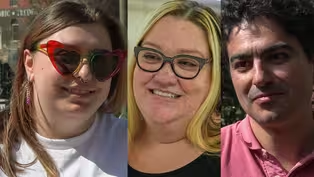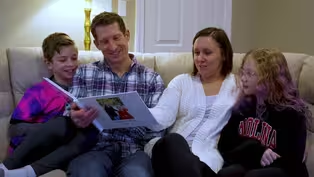VPM News Focal Point
In Focus | Dr. Erica Anderson and Narissa Rahaman
Clip: Season 2 Episode 3 | 15m 28sVideo has Closed Captions
Narissa Rahaman and Dr. Erica Anderson discuss school policies in Virginia for LGBTQ youth
In Virginia, the debate about school policies regarding LGBTQ+ students continues to divide communities. VPM News’ Keyris Manzanares discusses these issues with Narissa Rahaman, executive director of Equality Virginia and Dr. Erica Anderson, a clinical psychologist – who is a transgender parent and the former president of the U.S. Professional association for transgender health.
Problems playing video? | Closed Captioning Feedback
Problems playing video? | Closed Captioning Feedback
VPM News Focal Point is a local public television program presented by VPM
The Estate of Mrs. Ann Lee Saunders Brown
VPM News Focal Point
In Focus | Dr. Erica Anderson and Narissa Rahaman
Clip: Season 2 Episode 3 | 15m 28sVideo has Closed Captions
In Virginia, the debate about school policies regarding LGBTQ+ students continues to divide communities. VPM News’ Keyris Manzanares discusses these issues with Narissa Rahaman, executive director of Equality Virginia and Dr. Erica Anderson, a clinical psychologist – who is a transgender parent and the former president of the U.S. Professional association for transgender health.
Problems playing video? | Closed Captioning Feedback
How to Watch VPM News Focal Point
VPM News Focal Point is available to stream on pbs.org and the free PBS App, available on iPhone, Apple TV, Android TV, Android smartphones, Amazon Fire TV, Amazon Fire Tablet, Roku, Samsung Smart TV, and Vizio.
Providing Support for PBS.org
Learn Moreabout PBS online sponsorshipKEYRIS MANZANARES: In Virginia, the debate about school policies versus parental rights continues to divide communities.
One of the most controversial bills in this year's General Assembly would've required that teachers notify parents if their child identifies as transgender in school.
Joining us today to discuss this is Equality Virginia's Director, Narissa Rahaman, and clinical psychologist Dr. Erica Anderson, who is a transgender parent and the former President of the US Professional Association for Transgender Health.
She refers to herself as Dr. Erica.
Dr. Erica, you've spoken out in support of parental notification.
Why do you think it's important for teachers to notify parents if their children are having conversations about their identity?
ERICA ANDERSON: Private conversations is one thing, but if a school has supported adopting a different name and different pronouns than parents know them by, that's what I'm concerned about.
De facto, that is supporting a social transition of a child at school from one gender to another, and there's no professional society in the world that recommends having social transitions be done without parents.
I certainly cannot support that, and so I've been speaking out saying I want a collaboration between educators and parents around the issues with gender questioning youth.
There are a lot of other controversies about gender questioning youth, which I speak about and write about elsewhere.
But for now, what I'm concerned about is schools going their own way, and, in effect, creating a double life for children, which is not to their benefit.
KEYRIS MANZANARES: Narissa, what are your concerns about requiring notification?
NARISSA RAHAMAN: Yeah, I first just want to say, you know, thank you so much for having me on today, and, you know, for allowing me to talk about the issues facing LGBTQ Virginians.
You know, we're in a really critical moment right now.
As you mentioned, lawmakers this year, you know, introduce the most anti-LGBTQ bills in our legislative history.
And, you know, all of these bills are wrong, and it's cynical, and it's a stark reminder of how tenuous our rights can be.
You know, our main concern is, and let's be real, we wish that every child came from a supportive household, but we know for LGBTQ youth that that's not always true.
And whether and how to come out is a a deeply personal decision that should be respected.
You know, if a young person does not feel safe telling their family that they're LGBTQ, their school or teacher could be putting them at serious risk by disclosing that information.
We absolutely want students, especially LGBTQ youth, to feel safe and affirmed in their school environment.
It's where they spend a majority of their day.
And we know that when we affirm identities, and, you know create supportive environments for students, it can, you know, lead to academic success, and also has just long-term mental health benefits for these kids.
KEYRIS MANZANARES: Dr. Erica, how can schools and parents best support students who have questions about their gender identity?
ERICA ANDERSON: Well, schools and parents have had a long history of collaborating together in the wellbeing of children, and that's my interest going forward.
Every child should get what they need.
But the challenge here for situations where a child might make a social transition in terms of gender, and that's my narrow focus here, not just general support of LGBTQ youth, where a child might be exploring a gender different than their parents understand them, and ask the school to keep that from their parents, I think, is a terrible idea.
It sets up a rupture between children and parents.
It potentially teaches children to be deceptive with their parents.
I understand Narissa's point I myself am transgender.
I'm not oblivious to the fact that there are some households which are not supportive of LGBTQ youth, and, particularly, trans youth, but to wholesale adoptive policy that deprives parents of providing the support that we know is necessary for a child to succeed, who is gender questioning or gender variant, is a mistake.
There are remedies for issues with parents.
We have parent-teacher conferences.
Teachers are mandated reporters of suspected child abuse, so there are other avenues to use to deal with this, but I think creating a rupture between children and parents is a bad idea.
KEYRIS MANZANARES: Narissa, what do you think is the best way to support students?
NARISSA RAHAMAN: Yeah, you know, here in Virginia, several years ago, trans students, educators, parents, and other stakeholders came together to create a model policy that was evidence-based and provided best practices for educators and school personnel on how to best create affirming learning environments for students.
The goal of these policies was really to provide some protections for students at schools.
The ultimate goal was to to reduce bullying and harm at schools.
These were great policies, again, developed with a lot of stakeholders.
I think the one thing the schools can do is, you know, make sure that these policies are in place, not just for the students, but really for the educators.
You know, these are teachers who already make difficult decisions every day about how to respond to student concerns and protecting their students' wellbeing.
And that's what these model policies were aimed to do.
We've recently seen our governor attempt to roll back and reverse those policies.
That would really put LGBTQ youth at, you know, an increased risk for harm and bullying and discrimination.
You know, I will say that, forcing, you know, forcing folks to comply with a one size fits all rule really just makes it harder for everyone involved.
And, you know, it doesn't make things any easier, especially when we're thinking about sensitive situations, you know, for each individual child.
At the end of the day, you know, we know in not only in the work that we do, but the conversations that we have with students, educators, and parents, that students thrive in school when they have, you know, supportive affirming policies and when they have supportive and affirming adults in their lives, and that includes educators and school personnel.
If a student, you know, sees their teacher as someone that they may not be able to trust, you know, that could really erode a relationship that's very important and critical to that student's success at school.
And that's true for students, whether they're LGBTQ or not.
KEYRIS MANZANARES: Some critics say that advocating for parental rights in these gender issues is a failed way for the political right to disavow the LGBTQ+ community, rather than a true attempt to empower parents in supporting their children.
It's becoming a political issue.
I'm wondering how each of you sees this standoff, and what you think can happen to depoliticize this topic and foster true dialogue.
ERICA ANDERSON: I want dialogue to go on, civil dialogue to go on.
I want parents and teachers to be talking.
Certainly we have a longstanding history of educators collaborating with parents in the education of their children, in the health and wellbeing of their children, but parents ultimately have the legal responsibility for their children, and they really cannot be cut out of the equation.
It's one thing to have a private conversation between a teacher and a student, and it's another thing to adopt a different name and pronouns and do it throughout the school, but deprive parents of that knowledge.
I'm not supporting that.
KEYRIS MANZANARES: Narissa, what are your thoughts on this?
NARISSA RAHAMAN: I mean, I'm here to share sort of what I'm hearing from Virginia families, and students, and teachers that we've had conversations with, but you bring up an important point about what we're seeing around the country.
You know, we are facing the worst attack on LGBTQ dignity and humanity that we've seen in decades, and that includes here in Virginia.
This year around the country, and in previous legislative sessions as well, anti-equality lawmakers have, you know, launched an unprecedented legislative assault on LGBTQ people in state legislatures across the country, including here in our own General Assembly.
We have already surpassed 2022 as the worst legislative session on record for introducing and enacting anti-LGBTQ legislation.
And we are just in, you know, this first week of March.
You know, so far around the country, over 400 anti-LGBTQ bills have been introduced.
I think it's important to say that, you know, these bills aren't driven by constituent demand.
They're part of a coordinated effort driven by very well-funded organizations, powerful interest groups, and, you know, promoted by a very, very tight network of anti-LGBTQ forces.
These are groups like The Heritage Foundation, Alliance Defending Freedom, and Focus on the Family, who often write and lobby for the passage of these bills, that our carbon copy state to state.
Here in Virginia, a lawmaker introduced a bill.
It was the exact same bill that was introduced several years ago in Idaho.
The ultimate goal for these groups and what they try to do is that they pedal in the the fear and they pit people against each other with the sole goal of marginalizing and punishing LGBTQ people, especially transgender children.
We especially see this happening before big elections, which we have happening here in Virginia in November, which is why we saw over 12 anti-trans bills introduced this year.
And so, you know, we can talk all day about parental rights, we can talk about, you know, book bans, we can talk about content parents feel are in materials.
At the end of the day, there's only one goal for these bills, and it is to harm LGBTQ people.
KEYRIS MANZANARES: Narissa, what can be done to ensure transgender rights in Virginia?
NARISSA RAHAMAN: Yeah, you know, we have made a lot of great strides over the past several years in introducing protections for LGBTQ people.
You know, just three years ago, Virginia was the first in the South to enact non-discrimination protections.
You know, I think what needs to happen is that when we better understand who LGBTQ people are, I think, you know, folks understand that we are a community that's deserving of rights and an equal protection as well.
You know, LGBTQ people, they are our friends, our families, our teachers, our doctors, our neighbors.
And I think when folks understand who we are, you know, see us as human beings, you know, the goal and the hope is that, you know, you wouldn't want to remove protections or rights from, you know, your friends or your family members, and so why would you want to do that for LGBTQ people?
KEYRIS MANZANARES: Dr. Erica, what are your thoughts on this?
ERICA ANDERSON: Well, I support Narissa's comments.
I am a transgender person, and I have been the subject of discrimination, so I know very personally how horrible it can be.
I've done a lot of things in my career to try to rail against discrimination and to promote the rights and wellbeing of, particularly, transgender people, but LGBTQ people in general.
Certainly non-discrimination laws are important, but I'm old enough to remember that the Civil Rights Act was passed in 1964, and we still have discrimination in the United States, unfortunately.
So it's going to be a long road, a long struggle.
I won't be there to get to the mountaintop, as someone else said, but I hope to see a lot of progress in the time I have remaining, and I'm committed to it.
KEYRIS MANZANARES: Dr. Erica, how do we depoliticize this issue and encourage an open dialogue?
ERICA ANDERSON: Well, like most of you, I suspect I want more light, less heat.
I want to have a civil discourse about the issues.
I came on to speak about the narrow focus of schools and parents with regard to gender questioning kids.
But there are many aspects of this, some of which Narissa has addressed, which are really important.
We do need to create safe schools.
We do need to forge a working relationship between parents and children.
We need to have policies that not only protect children, but also protect teachers who try to do the right thing for their students every day.
I'm sympathetic to all of that.
I've been part of this dialogue for a long time.
I've spoken out against the anti-LGBTQ and anti-trans bills in state legislatures all over the country, so I'm in it, I'm in the fight.
But I think what we have to do is talk through some of the issues that are coming up, including the whole notion of creating, potentially, for gender questioning kids, a double life.
I don't think that's to the advantage of kids and families.
I've dealt with some families where that rupture has occurred, and kids have gone down the road with one life, with one name and pronouns, a set of pronouns at school, and another at home, and that's a horrible situation.
It takes quite a bit of work to recover from that.
I do not operate on the understanding that all parents are going to be non-accepting of LGBTQ youth.
That's not my experience.
I think most parents love their children, but navigating the issues from a public policy perspective is really, really important.
KEYRIS MANZANARES: Dr. Erica and Narissa, I want to thank you both for joining us today for us to have this conversation together.
>>Thank you for having me.
>>Yeah, thank you so much again.
Gender and Identity | People of Virginia
Video has Closed Captions
Clip: S2 Ep3 | 1m 13s | People of Virginia discuss gender, identity and legal protections for the LGBTQ community. (1m 13s)
Parenting trans youth in a contentious political climate
Video has Closed Captions
Clip: S2 Ep3 | 7m 57s | Why is parental support so important for the health and safety of transgender youth? (7m 57s)
Protecting the right to same-sex marriage in Virginia
Video has Closed Captions
Clip: S2 Ep3 | 1m 38s | Virginia’s constitution bans same sex marriage, while federal law protects that right. (1m 38s)
Reflecting with relief on how far they’ve come
Video has Closed Captions
Clip: S2 Ep3 | 4m 27s | The LGBTQ+ community is growing as public acceptance increases (4m 27s)
Richmond Triangle Players Celebrates Queer Artistry
Video has Closed Captions
Clip: S2 Ep3 | 3m 31s | Founded in ‘93 Richmond Triangle Players celebrates queer artistry and LGBTQ+ experiences. (3m 31s)
Supporting families with transgender loved ones
Video has Closed Captions
Clip: S2 Ep3 | 8m 17s | He She Ze and We supports families with transgender loved ones. (8m 17s)
Providing Support for PBS.org
Learn Moreabout PBS online sponsorship
- News and Public Affairs

Top journalists deliver compelling original analysis of the hour's headlines.

- News and Public Affairs

FRONTLINE is investigative journalism that questions, explains and changes our world.












Support for PBS provided by:
VPM News Focal Point is a local public television program presented by VPM
The Estate of Mrs. Ann Lee Saunders Brown





